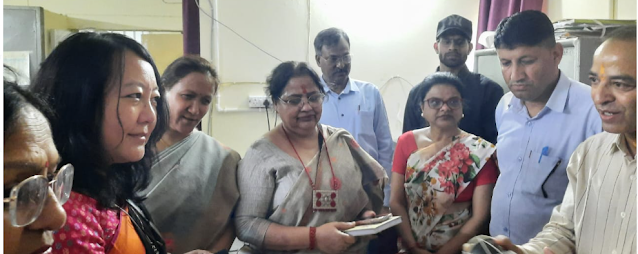During the review meetings with the central secretary, discussions were held on various aspects of education, including the importance of school-based assessment centers and the utilization of mobile applications for educational purposes. Efforts to increase student enrollment and improve education through various programs were also highlighted to the education secretary.
Subsequently, Heading chair Ms. Kesang Yangzom Sherpa, IRS Member Secretary, Joint Director CIET-NCERT Dr Amrendra Behra and his team visited SCERT Uttarakhand campus and have close interaction with each department and sharing of best practices and initiative taken by SCERT to innovate technology and play way resources as per the local based curriculum and material what NEP 2020 had insights and vision. The team inspections were conducted at the DIET Dehradun, where various types of programs were examined and where discussions were held on the ongoing programs run by different departments.
Information was provided about the current curriculum-related programs through SCERT. Various programs initiated by NCERT were also highlighted. During this process, special emphasis was placed on sharing insights during the sharing session with Joint Director Amarendra Behra regarding the digital content being created for PM e-Vidya by the IT department.
The Director Academy of Research and Training, Bandana Garbyal highlighted the fundamental need and performance-based job indicator to sustain quality in education. Joint Director Behra appreciated the efforts made to provide solutions to various important issues during the discussion. During the visit of officials from NCERT and CIET, various departmental heads were also present, including Joint Director Kanchan Devradi and Asha Rani Painuilly, along with Assistant Director Dr. K.N. Bijalwan and Mukesh Semwal. Each department shared their best practices and experiences in experiential learning.
Kanchan Devradi, the Joint Director, highlighted the department's innovative methods in integrating experiential learning into the curriculum, focusing on practical, hands-on activities to enhance student engagement and understanding.
Asha Rani Painuilly, a Joint Director, elaborated on the department's initiatives to incorporate real-world experiences into the learning process, providing students with opportunities for immersive learning outside the classroom.
Dr. K.N. Bijalwan, the Assistant Director, discussed the department's efforts in developing interactive learning modules and educational materials that promote experiential learning across various subjects and grade levels. Concerned shared insights into how the department collaborates with external partners and stakeholders to create meaningful experiential learning opportunities for students, such as field trips, internships, and community projects.








